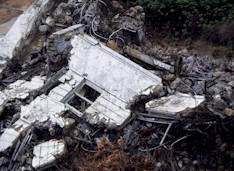
Contempt and scorn froth up virtually every time Bush says the word “government.”
On its surface, this should strike us as an odd attitude for someone who presides at the helm of his nation’s government.
What's behind it?
One key fact we should not lose sight of is that George W. Bush has been suckling at the public teat--and biting at it--pretty much throughout the course of his life. Government was the source of his father’s salary throughout his childhood and youth. Then when George the Younger tried to strike out on his own, he never managed to get very far. Although he has been billed as the “CEO President,” the fact is that when he tried his hand at various business ventures, he repeatedly displayed a tendency to get in over his head, and ended up relying on his dad’s friends (and the attendant closeness to government) to bail him out.
Given this background, it is germane to wonder if perhaps the biggest reason Bush hates government is actually because of his own dependence on it. Does it remind him too much of his ineffectuality?
In his relationship to government, Bush also appears to be displaying something akin to the distaste that many people feel for institutional food.
People commonly disparage the offerings of school and workplace cafeterias, even when the food is actually pretty good. There seems to be something about having to eat at a particular place that just rankles people.
Although Bush has fed remarkably well at the public trough throughout his life, apparently the fact that he has “had” to derive his sustenance there (never having been able to truly provide for himself) impels him to make incessant faces about it and loudly proclaim its yuckiness.
If all we were dealing with in Bush were various forms of resentment of his dependence on government, we might not be doing too badly with him as President. Unfortunately, the kind of scorn he heaps on government is also typical of a smalltime schoolyard bully piling abuse on some hapless dweeb.
When nasty kids victimize the smallest and weakest of their number, typically what they’re trying to do is distance themselves from certain characteristics they want to deny in themselves. Given George W. Bush’s lifelong financial dependence on government…well, how closely does the proverbial shoe have to fit before it is worn?
Another pertinent aspect of schoolyard bullying is that once a target has been demeaned beneath a certain point of social status, he can be abused virtually at will, without fear of social approbation. In fact, in some quarters, the abuse is considered entertaining, and applauded accordingly.
Bush has learned that by heaping on enough abuse, he can create a social environment where government is in the role of the reviled dweeb, and few people would be willing to defend it. At this point, he can take pretty much whatever he wants from it, and it's all part of the same bashing--abuse that, because of its demonstrated dweebitude, government somehow "deserves."
In fairness, this type of behavior is not limited to Bush, among a certain set of Washington-connected personages.
Consider William Bennett, ever fond of lambasting the wasteful idleness of bureaucrats, who, once ensconced as Secretary of Education, immediately put a cadre of his own ideologues on the government payroll who had no functional responsibilities whatsoever, other than to produce more rants against the idle minions of government.
Or consider the behavior of the wealthy cruise line operator lucky enough to be awarded a government contract to moor a ship along the Gulf Coast to house post-Katrina reconstruction workers. The cruise line billed the government more than twice the amount per person that it would have charged its guests as individual consumers to take them sailing on a vacation through the Caribbean.
Then consider Bush himself, whose career of government bashing has never rendered him at all shy about feeding from the public trough--or about inviting his comparably well-fed buddies (from Halliburton, from the oil industry, etc.) to join the party.
How much might each successive orgy of such public-financed self-indulgence an already-threatened sense of self in George W.? And considering what is now commonly known about patterns of abusers, is there much chance that such a drop could fail to touch off a new (and worse) round of bashing
It is not a pretty prospect to contemplate.
What is no less bizarre is the way that we in the electorate have acquiesced in his behavior--often vigorously applauding it--when it should have been self-evident that whenever Bush plundered the public treasury to satisfy his own personal wants, it was actually our own wallets that he was raiding.


